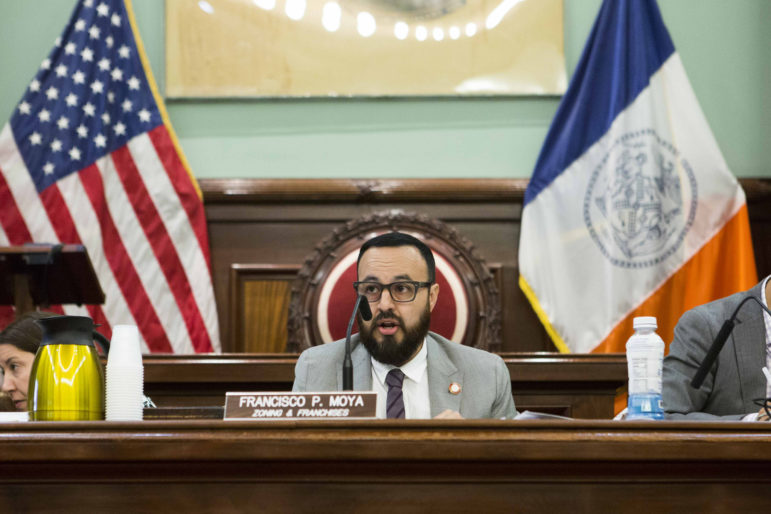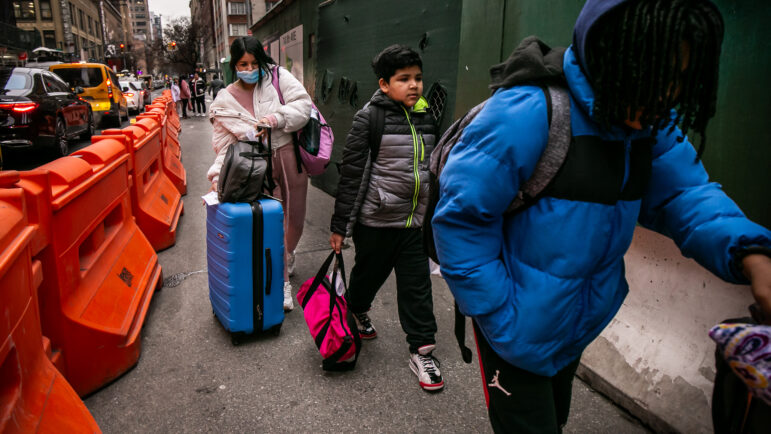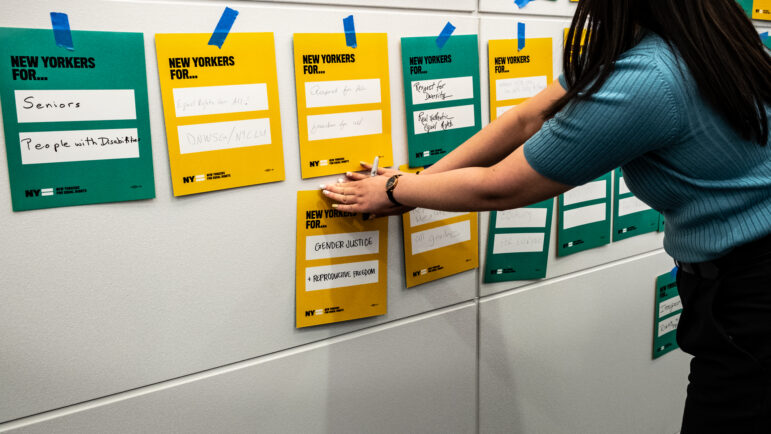
Emil Cohen for the New York City Council
Council Subcommittee on Zoning and Franchises chair Francisco Moya, a member from Queens, had harsh words for the de Blasio administration's approach to rezoning during the final stages of the Inwood approval process last week.
Last week, the City Council’s subcommittee on zoning and franchises voted for the de Blasio administration’s Inwood rezoning plan after waiting over three hours to start its scheduled session.
Queens Councilmember Francisco Moya, the chair of the subcommittee on zoning and franchises, voted for the rezoning. But then he made an emphatic statement to the public and his colleagues.
While acknowledging that rezonings will be part of the solution to the housing crisis, Moya insisted that more wage rules and safety protections were needed to cover workers involved in constructing new developments after a rezoning. He said a more deliberate effort needed to be made to study the impact of previous rezonings, especially their secondary displacement effects. He demanded City Hall hand over more data on NYCHire so Councilmembers could evaluate how successful it has been at promoting local hiring.
Most important, Moya said, the city’s reliance on mandatory inclusionary housing to create affordable units troubled him. “I believe we need to change the conversation and stop relying on the market to save us.” (You can watch Moya’s statement here, beginning at 1:59:50.)
Afterwards, he said in a press statement that he had decided to pause negotiations with the mayor’s office on all future rezonings until a task force is created to investigate critical issues related to neighborhood zoning changes.
He said this decision was his alone, “I leave it up to the rest of the City Council and the members of the Committee on Land Use and the Subcommittee on Zoning and Franchises to make their own decisions. They are free to continue negotiating with the administration, but they will do so without me…I believe this task force is critical to making informed decisions.”
“Good policies come from good data, and we are sorely lacking that with respect to neighborhood rezonings. What we do know is deeply unsettling: This administration has operated under the cloak of ending ‘a tale of two cities’ but has in practice turned working-class New Yorkers against themselves while propping up developers. I refuse to continue participating in conversations where the other side refuses to answer important questions that New Yorkers and the City Council are asking,” Moya said in his statement.
According to Moya’s statement, the pause in negotiations will only affect neighborhood rezonings and not spot rezonings. The City Council is not expecting any neighborhood rezonings to take place until next year.
In an email response, a spokesperson for City Council Speaker Corey Johnson office said, “This is a heated subject and I understand people having strong opinions about it, and different members having different concerns and issues when it comes to housing. That said, the Council has a responsibility to provide affordable housing for low-income and middle-class New Yorkers. We will continue to take that responsibility seriously, and we will continue to work with all stakeholders in communities across the city to resolve ongoing concerns and deliver real investments in parks and schools and badly needed affordable housing.”
Moya tells City Limits his concerns are not new.
“I have been talking about for quite some time. I have calling this administration out from day one,” he says, pointing to what he says is a lack of transparency and a tendency by the administration to wait until the last minute to negotiate key parts of each rezoning deal.
But it’s not just the process that bothers him — it’s the lack of understanding of rezoning’s impact. Some believe rezonings foster displacement, but others argue they are a defense against displacement pressures that are already coming to bear.
For Moya, that’s why a task force is needed. “If we cannot have this discussion now then when we can we have them?” he asked. “What are the displacements that take place? We are on rezoning number five, why not look at what happened?”
In an email response, the mayor’s office emphasized Moya’s decision does not stop the city from continuing through with the rezoning process.
“Not a problem. We look forward to our continued negotiations with local Councilmembers, the speaker’s office, and the Council’s land use staff,” a spokesperson from the mayor’s office said.
The de Blasio administration set out to rezone 15 neighborhoods. It has done five—East New York, Downtown Far Rockaway, East Harlem, Jerome Avenue and Inwood. One, for Flushing West, was withdrawn. Rezonings for Bushwick and Gowanus, shaped by extensive community processes, could be on the table by mid-2019.
It remains to be seen whether plans will move ahead for Bay Street, Southern Boulevard or Long Island City—and whether a bid to rezone part of Chinatown, but not the large section covered by a community-generated plan, will move forward.









2 thoughts on “Councilmember Explains his Personal Protest Against Mayor’s Rezonings”
What does Moya want? I’m confused by his demands. Sounds like he really can’t do anything but complain about the rezonings. What am I missing here?
The S.I. Bay Street rezoning is apparently going forward according to S.I. Boro Pres James Oddo. BP Oddo is opposed to the proposed 16-story apartment buildings in an area with aging limited road, water and sewer infrastructure.
https://www.facebook.com/statenislandusa/posts/1832149626878045
Moya is responding to many community groups feeling that the city’s vision for rezoning is counter to the needs of the community. The city planning commission presents its rezoning vision, rather then accepting suggestions and demands from the community it is rezoning. He feels that the city does not truly understand how bringing in market rate and so called affordable housing to a poor community will impact it. This is what he means by “propping up developers” who stand to benefit most from market rate housing. Community groups feel sold out by the city’s vision—Moya seems to understand that, and feels a need for change.